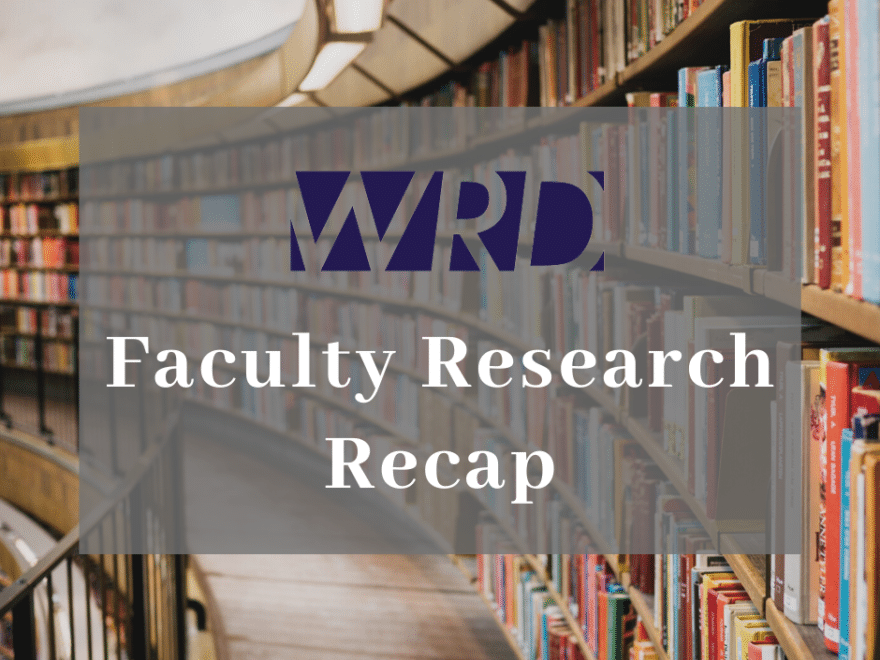Wonder what our WRD faculty members have been up to in the last five months? It turns out a lot! Catch up on some of the latest faculty research updates below.
Professor Tim Elliott presented a talk at the Conference on Community Writing (CCW) held in Philadelphia, Pennsylvania in October. His talk, titled “Enhancing Sustainable Community Partnerships Through Technical Documentation,” described the tutoring program he developed that partnered DePaul students with high school students to tutor them as they wrote their college admissions essays, which occurred in collaboration with local community partner TCEP in Little Village. Professor Lisa Dush also presented at the CCW conference.
As a Wiki Scholar this past summer, Professor Julie Bokser participated in inimmersive training on the Wikipedia platform and culture, doing research, writing, and editing of Wikipedia entries relevant to women’s suffrage. The objective of the course, which was a partnership between the National Archives and Records Administration and the Wiki Education Foundation, was to improve public understanding of topics related to women’s suffrage as part of the 100th anniversary of the 19th amendment next year. Professor Bokser also recently published “Inventing the Lady Manager: Rhetorically Constructing the ‘Working-Woman” in Peitho about women’s leadership and rhetorical practices during the 1893 Chicago World’s Fair.
Professors Pete Vandenberg and Erin Workman both gave talks at the Council of Writing Program Administrators (CWPA) Conference in Baltimore, Maryland in July. With their co-presenter, MAWRD student Maddy Crozier, the panel shared results from an institutional ethnography of writing at DePaul. Pete and Maddy also shared their findings at the Association of Rhetoric & Writing Studies (ARWS) Conference in Austin, Texas in November.
In addition to these panel presentations, Professor Erin Workman co-authored an article with Kathleen Blake Yancey, Matthew Davidson, Liane Robertson, and Kara Taczak. The article, titled “The Teaching for Transfer Curriculum: The Role of Concurrent Transfer and Inside-and-Outside School Contexts in Supporting Students’ Writing Development,” will appear in College Composition and Communication in December.
Professor Jason Kalin participated in the Rhetoric Society of America (RSA) Project in Power, Place, and Publics: Rhetorical Cartographies of the UNR Campus Master Plan hosted by the University of Nevada, Reno in May. He participated in the working group titled “Visual and Material Rhetorics of the City,” which attempted to design a “convivial space” called “Innovation Alley” for the University’s new campus plan, a project they presented in a talk titled Designing Innovation Alley: Inventing New Possibilities for Civic Learning & Living. Professor Kalin also attended the “Writing Sensory Rhetorics” workshop at the 2019 RSA Summer Institute, hosted by the University of Maryland, College Park in June. In November, Professor Kalin will co-present with David R. Gruber a paper titled “Feeding Time: Chronos, Microbiota, and Experimenting with Bodies that Eat to Survive” at the National Communication Association Annual Convention in Baltimore. In this presentation, they will develop an “embodied chronistic criticism” to understand the “immanent temporalities” of bodies, microbiota, and probiotic foods.
Professors Tricia Hermes and Amy Hornat-Kavel co-presented a talk at the Annual Association for Business Writing (ABC) Conference in Detriot, Michigan in October. Their presentation was called “Using Technology Tools To Foster Community and Inclusiveness in Online Business Writing Classes.”
An article co-authored by Professor Jason Schneider and Ralph Cintrón (University of Illinois at Chicago) titled “Things of the World: Migration, Presence, and the Arts of Presencing” was published in the Philosophy & Rhetoric journal. Another article by Professor Schneider and Modern Languages Professor Li Jin was recently accepted for publication to the Journal of Language, Identity, and Education. The article, titled “International Students and Faculty Across the Disciplines: A Language Socialization Perspective” will appear within the next two years.
Professor Lydia Saravia’s article “Lessons from Guatemala: Fear of Cultural and Linguistic Loss and a Curriculum of Urgency” was published in the TESOLers for Social Responsibility Newsletter special issue on Indigenizing TESOL. She also published a piece co-authored with Paola Zitlali Morales and María Fernandez Peréz titled “Multilingual Mexican-Origin Students’ Perspectives on Their Indigenous Heritage Languages,” which appeared in the Association of Mexican American Educators Journal. Professor Saravia also co-authored an article with Syeda Raza, Zyshia Williams, and Dalal Katsiaficas titled “Interrupting the Cycle of Worrying: Financial Implications of the California DREAM Act in the Lives of Undocumented College Students” that was published in the Review of Higher Education. At the end of November, she will present her paper titled “Possibilities and Concerns: The Impact of ‘Global’ English on Indigenous Language Rights in Guatemala” at the annual meeting of the American Anthropological Association (AAA) in Vancouver, Canada.
